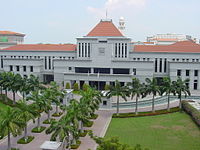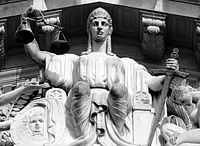- Non-constituency Member of Parliament
-
Singapore 
This article is part of the series:
Politics and government of
Singapore
- President: Tony Tan Keng Yam
- Parliament
- Constituencies
- Members of Parliament (MPs)
- Non-constituency MPs
- Nominated MPs
- Political parties
- President: Tony Tan Keng Yam
- Government
- Prime Minister: Lee Hsien Loong
- Cabinet
- Government organisations
- Judicial system
- Chief Justice: Chan Sek Keong
- Supreme Court
(Court of Appeal and High Court) - Subordinate Courts
Non-Constituency Members of Parliament (NCMPs) are members of the opposition parties who are appointed as members of the Parliament of Singapore even though they had lost in the parliamentary election.
The NCMP scheme was introduced in 1984 to provide a voice for the opposition in parliament. At that time, the Singapore legislative was dominated by the People's Action Party (PAP) and without members of the opposition parties during the period from 1968 to 1981. In 1981, an opposition candidate Joshua Benjamin Jeyaretnam won a seat in the Anson by-election and broke the PAP dominance in the legislature. However, Jeyaratnam could not initiate a meaningful debate, as he could not find another MP to second his motion. The PAP recognised the need for an "intelligent" opposition to provide more alternative voices in the parliament. Proportional Representation was at one time considered but was rejected because of worries that it could induce radicals to enter parliament.[citation needed]
In May 1984, Deputy Prime Minister Goh Chok Tong proposed an amendment in the Constitution to introduce the NCMP scheme. Goh believed that the presence of opposition MPs in parliament would check the PAP and voice discontent about government polices. His perception was that this would provide greater legitimacy to the legislature and greater public confidence in the Singaporean political system.
Since then, the standard arrangement has been that NCMP seats go to the top opposition losers who obtained more than 15% of the votes in their respective constituencies, although as evidenced below this is not always accepted. Opposition parties in Singapore and critics of the system often state that the system effectively permanently resigns non-PAP MPs to a 'second class' status and is a publicity stunt to lend legitimacy to the dominant party status of the PAP within the context of democracy in the country.
Later, in the 1984 general elections, the PAP saw a drop of 13.4% in its votes and lost two seats. One NCMP seat was offered but rejected by members of the opposition parties. In the 1988 election, Singapore Democratic Party's Chiam See Tong was the only opposition MP elected, and two Workers' Party members took the NCMP seats. In 1991, no NCMP seats were offered as four opposition MPs were elected to Parliament. In 1997, an NCMP seat was offered to and occupied by Joshua Benjamin Jeyaretnam. In the 2001 election, only 1 NCMP seat was occupied by Chia Kiah Hong Steve of the National Solidarity Party.
In the 2006 election, Sylvia Lim, the chairman of the Workers' Party garnered 43.9% of the vote in Aljunied GRC. As the best-performing opposition loser in the election, the Elections Department announced that one of the five members of Sylvia Lim's team would become the NCMP. After meeting with the Central Executive Committee of the Workers' Party, Sylvia Lim was nominated as the next NCMP in parliament.
Like Nominated Members of Parliament, NCMPs can vote on all issues except amendment of the constitution, public funds, vote of no confidence in the government, and removing the president from office.
Sylvia Lim said that government departments ignore her requests because she is an NCMP.[1]
Constitution Amendment to the NCMP Scheme
In April 2010, Parliament amended the constitution. Parliament may now have up to 9 NCMPs, up from 6. During the debate on the passing of the bill, Sylvia Lim, the sole NCMP in Parliament, argued that the amendment made a "bad situation better but increasing NCMPs is not the solution to a more robust political system"[2]
List of NCMPs
Parliament session Name Picture Born-Died Took Office Left Office Political Party Losing Constituency 07th Lee Siew Choh 
1917-2002 3 September 1988 31 August 1991  Workers' Party
Workers' PartyEunos GRC 08th No NCMP seats alloted during the 1991 election
31 August 1991—2 January 199709th Joshua Benjamin Jeyaretnam 
1926-2008 2 January 1997 3 November 2001  Workers' Party
Workers' PartyCheng San GRC 10th Steve Chia Kiah Hong 
1970- 3 November 2001 6 May 2006  National Solidarity Party
National Solidarity PartyChoa Chu Kang SMC 11th Sylvia Lim Swee Lian 
1965- 6 May 2006 7 May 2011  Workers' Party
Workers' PartyAljunied GRC 12th Lina Loh Woon Lee 1949- 7 May 2011 Incumbent  Singapore People's Party
Singapore People's PartyPotong Pasir SMC Yee Jenn Jong 1965- 7 May 2011 Incumbent  Workers' Party
Workers' PartyJoo Chiat SMC Gerald Giam Yean Song 1977- 7 May 2011 Incumbent  Workers' Party
Workers' PartyEast Coast GRC References
- ^ 各反對黨最後一夜呼籲 為子孫投票給更民主開放的新加坡 zaobao.com (主席林瑞蓮也道出自己當非選區議員的限制,她說過去八年她每週走訪選區,遇到需要幫助的居民她不能為他們寫信,因為政府機關不處理非選區議員投訴)
- ^ Parliament amends Constitution to change NCMP & NMP schemes, April 26, 2010
Constitution of the Republic of Singapore Text of the Constitution at Singapore Statutes Online Fundamental liberties Article 9 • Article 10 • Article 11 • Article 12 • Article 13 • Article 14 • Article 15 • Article 16
The Government The Legislature President • Parliament • Speaker • Elections (Presidential and Parliamentary) • Group Representation Constituency • Non-constituency Member of Parliament • Nominated Member of ParliamentThe Presidential Council for Minority Rights The Judiciary Supreme Court (Court of Appeal and High Court) • Subordinate Courts • Chief Justice • Judicial officersThe Public Service Citizenship Special powers against subversion
and emergency powersConstitution of the Republic of Singapore Tribunal Categories:- Singaporean Non-Constituency Members of Parliament
- Singapore government policies
Wikimedia Foundation. 2010.
